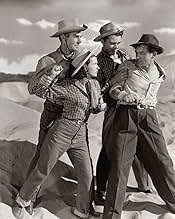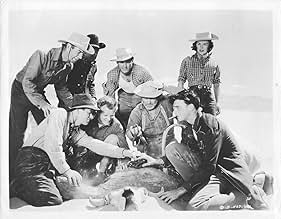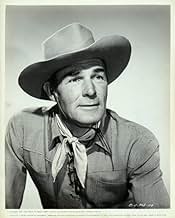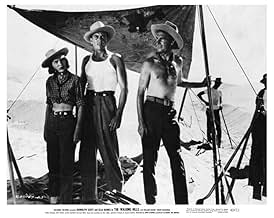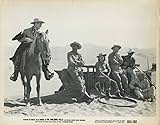VALUTAZIONE IMDb
6,4/10
1184
LA TUA VALUTAZIONE
Aggiungi una trama nella tua linguaA group of treasure hunters search for a wagon load of gold, buried years before in Death Valley.A group of treasure hunters search for a wagon load of gold, buried years before in Death Valley.A group of treasure hunters search for a wagon load of gold, buried years before in Death Valley.
Ralph Dunn
- Detective
- (non citato nei titoli originali)
John McKee
- Bronc Handler
- (non citato nei titoli originali)
Frank Merlo
- Bronc Handler
- (non citato nei titoli originali)
Jack Parker
- American Customs Guard
- (non citato nei titoli originali)
Charles Stevens
- Cleve
- (non citato nei titoli originali)
Frank Yaconelli
- Bartender
- (non citato nei titoli originali)
Trama
Lo sapevi?
- QuizSome regard this as the only "film noir" western, but that would be to disregard 'Pursued' and 'Blood on the Moon', among others.
- BlooperAt the end of the picture, just before Ella Raines rides off, she calls Randolph Scott, "Jeff", only his character's name is "Jim".
- Citazioni
Chris Jackson: [Referring to the large bandage on her forehead] Yeah, until I went bangin' my puss! Now get lost, will ya?
- Colonne sonoreYou Won't Let Me Go
Sung by Josh White
Recensione in evidenza
In 1948 the blockbuster movie John Huston's "The Treasure of the Sierra Madre" hit the big screen. This cinematic masterpiece took the entertainment world by storm and spawned several copies and variations including this early John Sturges flick. The same year 1949 saw a much better version on the same theme "Lust for Gold" starring Ida Lupino, Glenn Ford, and Gig Young, though neither reached the lofty peaks of Huston's classic. Coincidentally stalwart character actor Edgar Buchanan was in both films. Though "Lust for Gold" is better, "The Walking Hills" has its own merits. This thirst for hidden treasure is a recurring theme throughout mankind's existence on earth going all the way back to Soloman and before. During the post-World War II period when this film was released there was even a mad rush to find uranium because of the arms race involving the Cold War and the specter of the atomic bomb. Geiger counters became the rage. Hollywood hoped to cash in on this craze.
One facet of "The Walking Hills" that caught my attention was the role played by Randolph Scott(Would you believe Jim Carey?). Apparently a fairly well-to-do horse breeder who talks about the races, his energy and time centers more on his mare who is about to foal than on the gold or the attractive Chris Jackson, played with sexual magnetism by the lady with the hypnotic eyes Ella Raines. He comes across as somewhat selfish and even pushy when he assumes leadership of the group of fortune seekers who did not ask his assistance. Only Frazee (John Ireland), the apparent private dick, attempts to stand up to him to no avail. Naturally, his reason is as selfish as Carey's. Actually, this is one of the most complicated roles Scott ever played and he shines as the brilliant actor that he was.
Of the gold seekers, Arthur Kennedy is virtually wasted in a nondescript part. A face you seldom see on the big screen Jerome Courtland does a fine job in his part which is also somewhat mysterious. Willaim Bishop who tragically made too few films before his untimely death from cancer does well as the fugitive member of the gold seekers (Is he the only fugitive present?). Wily Edgar Buchanan as Old Willy talked the well-worn philosophy that he did so well. It's good to see the pop blues singer Josh White in a rare film appearance. One wonders why he didn't make more movies. His acting is almost as good as his singing and guitar playing. This is one of the few westerns (maybe the only one) that features the blues rather than country and western or Hollywood music. White was never quite the legend that Leadbelly was but some of his music was influential on the later folk revival in America.
The script by Alan LeMay who wrote the novel from which "The Searchers" was adapted, leaves a lot to the viewer's imagination. There is much that is hidden and esoteric. Some of it is revealed by director Sturges in flashbacks but much goes unanswered. This is a ploy used by Hitchcock in many of his films. Hitchcock believed that certain parts of a story should be left to the imagination. Apparently LeMay felt the same way.
There is much talk and conflict among the seekers that eventually leads to death for some of them. Nature intervenes in the form of a sandstorm, the highlight of this movie and not to be missed. Sturges shines as a director throughout with his innovative use of the camera, but the sandstorm is a treat to behold. The storm is also metaphorical. It washes away much and reveals much about human nature and the souls of the seekers. The Death Valley locale is appropriate for both story and character development.
The title "The Walking Hills" refers to the shifting sands that form dunes that seem to walk like humans. The sand dunes may also hide items mankind values and then suddenly make them reappear.
One facet of "The Walking Hills" that caught my attention was the role played by Randolph Scott(Would you believe Jim Carey?). Apparently a fairly well-to-do horse breeder who talks about the races, his energy and time centers more on his mare who is about to foal than on the gold or the attractive Chris Jackson, played with sexual magnetism by the lady with the hypnotic eyes Ella Raines. He comes across as somewhat selfish and even pushy when he assumes leadership of the group of fortune seekers who did not ask his assistance. Only Frazee (John Ireland), the apparent private dick, attempts to stand up to him to no avail. Naturally, his reason is as selfish as Carey's. Actually, this is one of the most complicated roles Scott ever played and he shines as the brilliant actor that he was.
Of the gold seekers, Arthur Kennedy is virtually wasted in a nondescript part. A face you seldom see on the big screen Jerome Courtland does a fine job in his part which is also somewhat mysterious. Willaim Bishop who tragically made too few films before his untimely death from cancer does well as the fugitive member of the gold seekers (Is he the only fugitive present?). Wily Edgar Buchanan as Old Willy talked the well-worn philosophy that he did so well. It's good to see the pop blues singer Josh White in a rare film appearance. One wonders why he didn't make more movies. His acting is almost as good as his singing and guitar playing. This is one of the few westerns (maybe the only one) that features the blues rather than country and western or Hollywood music. White was never quite the legend that Leadbelly was but some of his music was influential on the later folk revival in America.
The script by Alan LeMay who wrote the novel from which "The Searchers" was adapted, leaves a lot to the viewer's imagination. There is much that is hidden and esoteric. Some of it is revealed by director Sturges in flashbacks but much goes unanswered. This is a ploy used by Hitchcock in many of his films. Hitchcock believed that certain parts of a story should be left to the imagination. Apparently LeMay felt the same way.
There is much talk and conflict among the seekers that eventually leads to death for some of them. Nature intervenes in the form of a sandstorm, the highlight of this movie and not to be missed. Sturges shines as a director throughout with his innovative use of the camera, but the sandstorm is a treat to behold. The storm is also metaphorical. It washes away much and reveals much about human nature and the souls of the seekers. The Death Valley locale is appropriate for both story and character development.
The title "The Walking Hills" refers to the shifting sands that form dunes that seem to walk like humans. The sand dunes may also hide items mankind values and then suddenly make them reappear.
I più visti
Accedi per valutare e creare un elenco di titoli salvati per ottenere consigli personalizzati
- How long is The Walking Hills?Powered by Alexa
Dettagli
- Tempo di esecuzione1 ora 18 minuti
- Proporzioni
- 1.37 : 1
Contribuisci a questa pagina
Suggerisci una modifica o aggiungi i contenuti mancanti

Divario superiore
By what name was Le colline camminano (1949) officially released in India in English?
Rispondi
